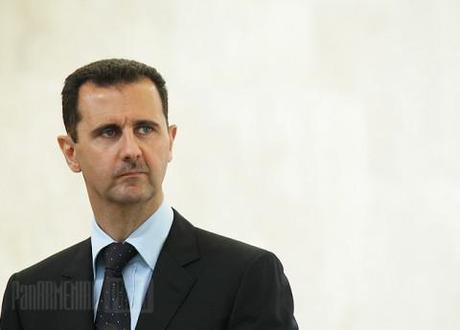
Syrian President Bashar al-Assad. Photo credit: PanArmenian Photo
World leaders have reacted with fury after Russia and China vetoed a UN resolution condemning Syrian President Bashar al-Assad’s violent crackdown on anti-government protesters. US Secretary of State Hillary Clinton described the veto as “a travesty”, while French Foreign Minister Alain Juppe spoke of a “moral stain” on the UN, reported the BBC. UK Foreign Secretary William Hague accused Russia and China of emboldening the Syrian president and argued that the veto would push the country closer to civil war.
The 11-month conflict has claimed an estimated 6,000 lives, reported The Telegraph, but there are suggestions the true death toll may be even higher. The news of the veto came as Assad forces launched an attack on the city of Homs, center of the resistance movement, which left at least 300 people dead. At least 50 people have been killed during the most recent assault on the city; a local resident told The Guardian that the army was using rocket-launchers, although the paper pointed out that this has yet to be verified.
Russia and China have defended their decision to wield the veto, accusing the UN of taking sides in the conflict and insisting on a diplomatic solution. But world leaders apparently remain committed to some form of intervention, with attention now turning to the Arab League plan for Assad to step down to allow Syria to begin the transition to democracy.
So why did Russia and China really decide to use the veto? And what next for Syria?
Anti-West sentiment. Russia and China acted out of “reflexive anti-Western motives” and to protect their interests in the region, said a Times (£) editorial. “Russia is determined, above all, to protect its naval presence in Syria, thwart Western interests in the region and shield a regime that now owes it an existential debt,” according to the editorial, while China is unwilling to back any UN resolutions supporting repressed peoples lest attention turns to Tibet. The Times editorial pointed out that the atrocities of the Syrian regime have now reached the world stage and can no longer be concealed by Assad supporters, which makes the China-Russia veto all the more morally reprehensible.
Russian Foreign Minister Sergei Lavrov described the Western reaction to the China-Russia veto as “almost hysterical”, according to Russia Today, and said: “Those who get angry are hardly ever right.”
Russian PM Vladimir Putin’s mistake. “Not for the first time Putin’s political antennae are failing him,” wrote David Hearst on The Guardian’s Comment is Free, arguing that the veto “stops an intervention that the west was never going to make”. According to Hearst, Putin’s judgment is clouded by “the isolation in which he lives”, as the Russian PM apparently doesn’t understand the ramifications of the veto for Russia: “The veto sets Russia on the opposite side of the table from the Arab League; it lifts the international responsibility for failing to staunch the blood flowing in cities like Homs off Barack Obama’s shoulders, and assumes that burden itself,” wrote Hearst.
“China does not have selfish desires in the Syria issue. As a responsible large country, China will join together with the international community to continue playing an active and constructive role on the Syria issue,” said Chinese Foreign Ministry spokesman Liu Weimin, reported The Wall Street Journal.
Russian resentment. “For all the inconsistencies and hypocrisy of Western behaviour, the position taken at the UN was laudable,” said John Kampfner in The Independent; the veto will now have given Assad confidence to carry on attacking his own people, and the only hope is that the regime “will implode as his own people summon yet greater strength to stand up”. Kampfner wrote that Putin’s decision was partly influenced by lingering resentment in Russia over the Libyan conflict: “They felt they were double-crossed by the UN resolution… What was supposed to be a no-fly zone became a full-scale military attack.”
Time to step up. “The diplomatic route is now all but exhausted. Having staked so much on a lost cause, Russia will strive to avoid humiliation,” wrote former UK Foreign Secretary Malcolm Rifkind and Shashank Joshi in The Financial Times. Joshi and Rifkind argued that there won’t be a NATO-style military intervention, but that “we can start by helping with logistics, intelligence, communications equipment and advice” to the Syrian opposition, with the ultimate aim of toppling the Assad government.

